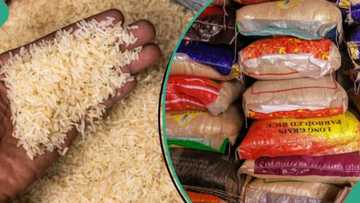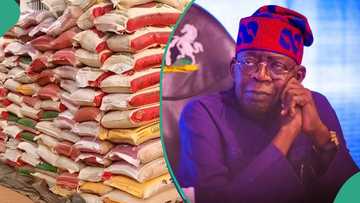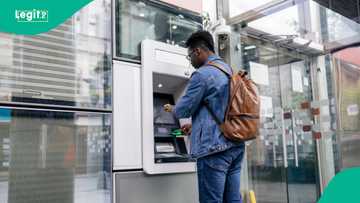Dollar Scarcity Hits Nigeria, Mauritius, Other African Countries, Central Banks Step In
- African central banks are stepping up their market operations to stabilize their falling currencies and lower import inflation
- Bloomberg reported that some African countries including Nigeria spent $400 million to defend their currencies
- According to experts, during terms-of-trade shocks, these interventions become more frequent and significant
Legit.ng journalist Zainab Iwayemi has over 3-year-experience covering the Economy, Technology, and Capital Market.
In an effort to support their collapsing currencies and reduce import inflation, African central banks are increasing their market interventions.

Source: Getty Images
According to Bloomberg data, since July, South Sudan, Mauritius, Nigeria, Zambia, and Zimbabwe have spent at least $400 million together to defend their currencies.
Days after allowing its currency to float freely, Ethiopia, intends to run an auction on Wednesday in an effort to narrow the difference between the official and parallel market rates.
PAY ATTENTION: Click “See First” under the “Following” tab to see Legit.ng News on your Facebook News Feed!
Although central banks routinely intervene in African currency markets, Benedict Craven, principal economist at the Economist Intelligence Unit, says that these interventions increase in frequency and magnitude during terms-of-trade shocks.
According to Craven, a number of factors could affect the scale and scope of interventions, such as capital flight, higher import or lower export prices, extremely high inflation, and the central bank's desire to utilize the exchange rate to stabilize the level of prices.
CBN intervenes in Nigeria
Nigeria, whose naira is the world’s second-worst performing currency after the Lebanese pound this year, in part due to the central bank ending years of foreign exchange controls in June 2023, has picked up the pace of interventions in recent weeks.
According to Razia Khan, chief economist for Africa and the Middle East at Standard Chartered Bank, the Central Bank of Nigeria has realized that, following years of market dysfunction, it does not have a functioning foreign exchange market unless it is somehow involved in supplying dollar liquidity.
“So the CBN has been both buying and selling foreign-exchange,” she said.
In order to relieve pressure on the local currency and address the growing unmet demand for foreign cash from companies looking to bring in imports and wealthy Nigerians having to pay for international school tuition, the bank recently sold $148 million to 29 lenders. On Wednesday, it also plans to host a retail auction.
According to Craven, if the objective is to reduce volatility, such actions can be sustained when supported by sufficient foreign exchange reserves.
“If the exchange rate is fixed or managed to an extent whereby it fails to be a signal of hard currency supply and demand then eventually there will have to be a devaluation when exports fall and foreign-exchange reserves run dry,” he said.
More African countries intervene
Mauritius invested $150 million last month to support the rupee after it fell to an all-time low. It seems that the action contributed to the currency's stability.

Read also
Prices of rice, other food items to crash as Customs is set to begin import waiver, sets rules
Markets have been reassured by Governor Harvesh Seegolam that the bank has the firepower to act and is prepared to do so. This week, the bank made a $20 million injection.
A build-up in demand for foreign cash at banks last month caused the Zimbabwe Gold, or ZiG, to drop against the US dollar. As a result, the country's central bank intervened to support the new currency. It gave the market a $50 million boost.
Recall that on April 5, the Zimbabwean dollar was replaced with the ZiG. The Zimbabwean dollar was discontinued earlier this year after losing 80% of its value in relation to the US dollar. At the moment, it is being used in addition to the dollar.
Persistence Gwanyanya, a member of the Reserve Bank of Zimbabwe's monetary policy committee, claims that the development should not come as a surprise given the multi-currency system that the southern African country runs under.
“If we have forex demand that can’t be met by voluntary liquidations, the central bank must step in. It has the reserves,” Gwanyanya said.
He added that the interventions in the interbank market will be “a permanent feature. This is the trajectory of where we are going.”
The South Sudanese currency, which has lost over one-third of its value compared to the US dollar this year due to dwindling oil revenues—the country's primary source of foreign exchange—was forced into intervention last week by the Bank of South Sudan.
“We have injected something above $8 million and plan to ensure the intervention is sustained,” Governor James Alic Garang said.
On how to improve dollar inflow into Nigeria, Charles Abuede, a financial analyst said,
"If Nigeria can address insecurity and terrorism concerns, oil theft and pipeline vandalism, we can begin to see an increase in our crude oil production to above 2mbpd or even close to 2.5mbpd to aid the increase in fx receipt."
Report predicts 3 sources Nigeria will get dollars
Legit.ng reported that a recent quarterly statistical bulletin from the Central Bank of Nigeria (CBN) has highlighted that foreign exchange (FX) consumers consumed more dollars in the three months ending in December 2023 than they did in the previous quarter.
The inflows will most likely come from World Bank budget finance, NNPC-related flows, and Eurobond issuance.
The inflows will most likely come from World Bank budget finance, NNPC-related flows, and Eurobond issuance.
PAY ATTENTION: Donate to Legit Charity on Patreon. Your support matters!
Source: Legit.ng






